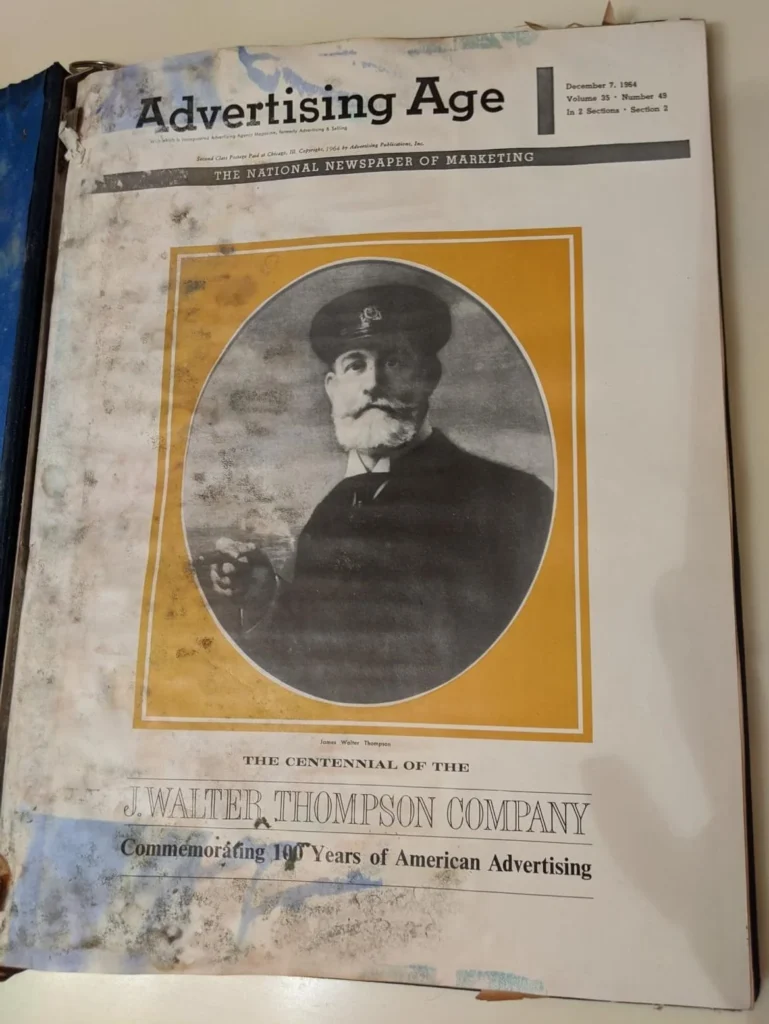By Lisa Merriam
AMA New York Board of Directors
The J. Walter Thompson Co. ceased to exist in 2019, ending a 155 year run for this venerable advertising agency.
The merger into Wunderman Thompson feels personal. My earliest memories of business involved going to my father’s J. Walter Thompson office in the Wrigley Building, walking past acres of desks topped with typewriters, flying paper airplanes out onto the Chicago River, and hoarding white “J. Walter Thompson Co.” pencils by the fistful. My father worked on the Kraft account in the 1960s, one of the actual “madmen.” He inspired my love of marketing from before I could walk.

I found a 1964 Advertising Age commemorating the agency’s 100th year in business that was presented to my father and other agency executives.

I apologize that the decades have as tough on the commemorative issue as they have been to the agency. A basement flood last year practically destroyed it.

Here is the dedication from the issue:
“It was on Monday evening December 5, 1864 that Captain William James Carlton, not to be officially mustered out of the Union Army until Thursday of that week, wrote in his diary:
‘Commenced to canvas for advertisements this morning for several papers.’
“He was chronicling the birth of Carlton and Smith Advertising Agents, for whom 20 year old James Walter Thompson went to work in 1868 and which he bought out and named for himself 10 years later.
“J. Walter Thompson Co. was not the first advertising agency in the United States, but it is the first in this country (and probably anywhere in the world) to celebrate 100 years of continuous operation.
“This in itself makes a “special issue” of Advertising Age useful and pertinent. But the centennial of J. Walter Thompson Co. coincides almost exactly with the growth and development of advertising, of advertising agencies, and of modern marketing and merchandising.
“When Carlton started what is now the J. Walter Thompson Co. in the closing days of 1864, as the War between the States was drawing to its end, he was—no doubt unconsciously—recognizing that the country stood on the threshold of great expansion and major change. For half a century the American economy and social structure had been gradually changing, under the impact of the irresistible forces of the development of mechanical power and the industrial revolution in its aftermath, plus a steady stream of immigrants to help people the far reaches of a still empty continent.
“America entered the war a relatively puny thing upon the world scene; it emerged as a power to be reckoned with in the councils of the world. But even more to the point here, it entered the war as an agricultural society, a society of small artisans and homecrafters; it came out pointed clearly and firmly towards urbanization and manufacturing, toward closer ties over greater distances; toward an integrated, unified society in which divisions of labor, greater efficiency and higher standards of living for the great masses of people who were not to be denied.
“In this metamorphosis, the advertising mechanism and the advertising agency system played a stellar role. Even in his early role as a jobber of publication space, the advertising agent was an important factor in force-feeding newspapers and developing magazines, and thus served to extend the flow of commerce across the far reaches of the continent and to encourage a unifying force which had tremendous implications for the social and political development of America, as well as for its economic growth.
“Today, in a society in which the major problem is more the development and maintenance of adequate demand rather than the ability to supply the demand, the advertising mechanism seems destined to fill a constantly larger niche; and the place and function of the advertising agency, as the specialized expert in mass communications and mass merchandising, seems assured. In this issue we take a brief, and sometimes sentimental look at a century of American advertising and advertising agencies, the J. Walter Thompson Co., whose domestic history and expansion overseas seems peculiarly to match the whole history of modern advertising.”
In the closing minutes of 2019 and the final year of the existence of J. Walter Thompson Co., the place and function of the advertising agency is not at all assured. Does JWT’s rise and demise still seem “peculiarly to match” the history of advertising?
I like to think J. Walter Thompson the man would embrace the change and find the opportunity in it. I know my father would have. He likely would have thrown this mold-crusted piece of memorabilia into the trash. I can’t!
















